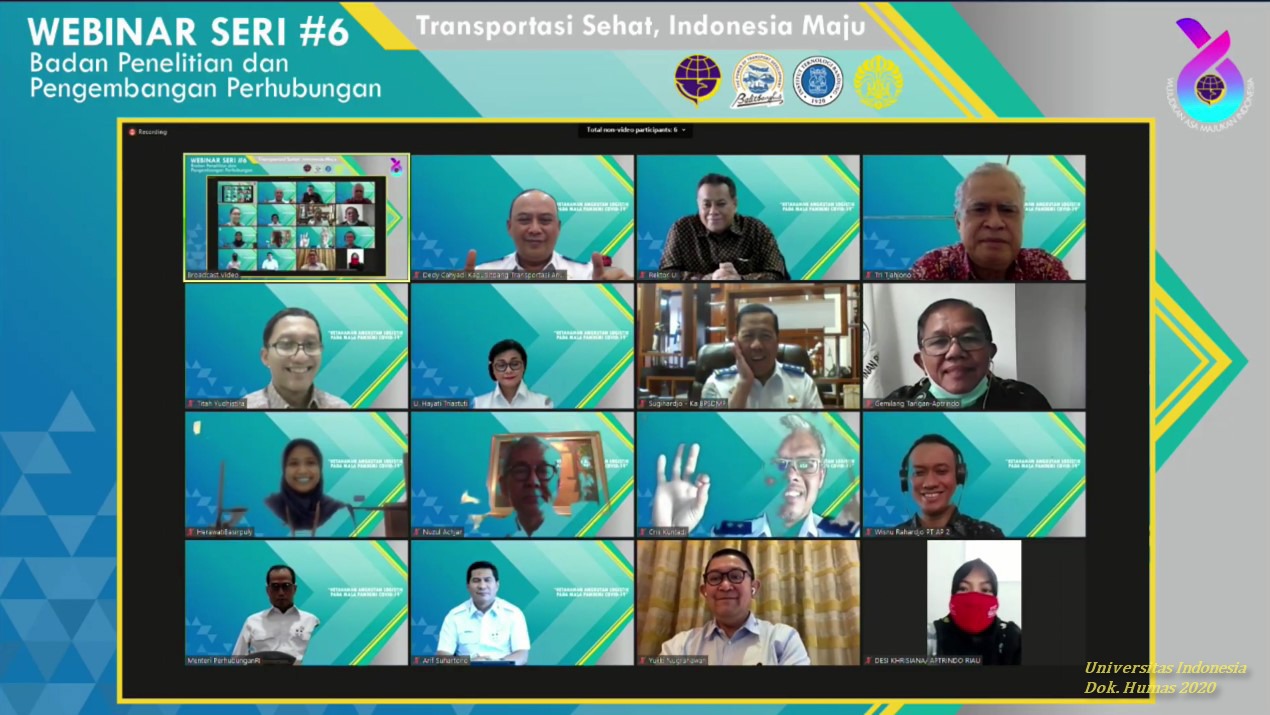UI Releases Results of Study on Logistics Resilience amid COVID-19 Pandemic through Fiscal Policies
Universitas Indonesia (UI) released the results of a study entitled “Strategy for Transportation and Logistics Transformation during Pandemic”. The study results were announced in the sixth webinar entitled “The Resilience of Transportation in Logistics during COVID-19 Pandemic” held in collaboration with UI’s Transportation Research and Development Department and Institut Teknologi Bandung (ITB). The webinar was part of the research and development program of the Ministry of Transportation to formulate policy/strategy recommendations and examine the capacity of people and industries affected by COVID-19 to adapt. The program is a collaborative effort of UI, ITB, Universitas Gadjah Mada (UGM), and Institut Teknologi Sepuluh Nopember (ITS). Minister of Transportation Budi Karya Sumadi and UI Rector Prof. Ari Kuncoro, S.E, M.A, Ph.D were present at the event to deliver keynote speeches.
Nuzul Achjar, M.Sc, Ph.D, a lecturer with the Master’s Degree Program in Economic Planning and Development Policy Studies, (MPKP), FEB UI, in his capacity as representative of UI’s Multidisciplinary Team, presented the results of the study on the macro economic condition during the pandemic and efforts to increase the resilience of transportation in logistics through fiscal policies. He said, “Prior to the pandemic, the growth of the transportation and warehousing sectors was declining, although still higher than national GDP growth. In Q1 2020, the sectors saw growth declining to 1.29%, but in Q2 2020, the growth rate plunged to -30.84%. This is a challenge for Indonesia’s logistics sector.”
Based on the study, UI’s Interdisciplinary Team recommends five fiscal policies to strengthen the resilience of the transportation industry. First, maintainng tax policies that favor lower compliance costs. Second, harmonization of central and regional governments’ tax policies. Third, harmonization of polices on non-tax state revenue (Penerimaan Negara Bukan Pajak, PNBP) that vary widely in terms of types and rates. The team proposes that the government consider relaxing the collection of non-tax revenue. By relaxation, it does not mean that the government should reduce or even abolish non-tax revenue collection; instead, the government should ease revenue collection policies, such as by extending the deadline for permit renewals or lowering the tariffs of certain services. Fourth, harmonization of policies on costs of transportation services provided by state-owned companies during the COVID-pandemic so as not to add to the burden of the aggregate cost structure of the sector and to increase the resilience of the sector. Fifth, comprehensive and impartial tax relaxation by taking into consideration tax collection policies at central and regional governments.
The UI team also proposes six macro and micro policy recommendations, namely stimulating the dynamics of other sectors; opening of seaports; implementation of health protocols at transportation hubs; provision of COVID-19 test kits by government; preparing human resources and technology to improve the performance of sea transportation; and restructuring the supply chains of certain comodities.
Tri Tjahjono, M.Sc, Ph.D (lecturer with UI’s Civil Engineering Department), added, “In this study, we also include discussions on the transportation service charges usually imposed by state-owned companies such as Angkasa Pura and Pelindo, as well as toll roads. The key is harmonization for policy efficiency. The pandemic has opened a good opportunity to improve the system and strengthen services.”
Tri also proposes logistics policy recommendations because “The high demand for certain commodities has caused a shift, from the use of land transportation to train-based multi-modal transportation as the backbone of logistics distribution. The use of trucks for pre-haul and last-mile deliveries and trains for long-haul deliveries of certain commodities (health equipment, fast-moving consumer goods/FMCG, etc.) is also worth considering for a more accurate delivery estimation as well as to increase delivery time and cost efficiency.”
In his speech, Minister of Transportation Budi Karya said, “The COVID-19 pandemic posed a huge challenge for various sectors in all countries in the world. The weakening of global economy has affected supply chains, particularly national logistics activity. Statistics Indonesia (BPS) data showed that the transportation and warehousing sectors suffered the deepest contraction, at 30.84%. Export, and import, and trade activities delined sharply due to weakening people’s purchasing power. In times of a pandemic, staple goods availabilty should be guaranteed. For the long term, policies are needed to ensure that logistics are well maintained. Logistics resilience should be maintained and this calls for collaboration, including with academicians, to discuss and study logistics issues amid the pandemic.”
Meanwhile, Prof. Ari Kuncoro said, “Stabilization and balance of supply and demand are keys to ensuring logistics resilience in the industry sector. Tax policy is an instrument the govenment can use to achieve certain objectives, including driving economic growth and improving the performance of logistics players in the transportation sector. On the other hand, from the government’s perspective, tax collection should be carried out efficiently so as not to disrupt the core function of tax in ensuring sustainable state revenue generation (revenue productivity aspect). This perspective has further added the urgency to the formulation of tax collection policies that support the resilience of the logistics sector without undermining state earnings in the long term. The government should take strategic measures to revive the economy and ensure the sustainability of business operations in various sectors while paying attention to global and national health protocols to break the chain of COVID-19 infections.” (hjtp)
Dra. Amelita Lusia, M.Si. CPR
Head of UI Public Relations Office and KIP
Media Contact: Egia Etha Tarigan, S.Sos, MM (media relations UI), humas-ui@ui.ac.id; 08151500-0002)





